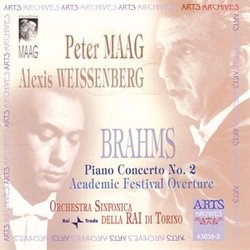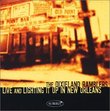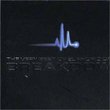| All Artists: Johannes Brahms, Peter Maag, Turin RAI Symphony Ochestra, Rome RAI Symphony Orchestra, Alexis Weissenberg Title: Brahms: Piano Concert No. 2; Academic Festival Overture Members Wishing: 1 Total Copies: 0 Label: Arts Music Release Date: 5/25/2004 Genre: Classical Styles: Forms & Genres, Concertos, Historical Periods, Modern, 20th, & 21st Century, Instruments, Keyboard, Symphonies Number of Discs: 1 SwapaCD Credits: 1 UPCs: 600554303826, 060055430382 |
Search - Johannes Brahms, Peter Maag, Turin RAI Symphony Ochestra :: Brahms: Piano Concert No. 2; Academic Festival Overture
 | Johannes Brahms, Peter Maag, Turin RAI Symphony Ochestra Brahms: Piano Concert No. 2; Academic Festival Overture Genre: Classical |
Larger Image |
CD DetailsSimilar CDs |
CD ReviewsBrahms P Cto 2, Weissenberg, Maag, RAI Torino: A 50 year old Dan Fee | Berkeley, CA USA | 02/13/2009 (5 out of 5 stars) "Start with some context. This recording is nearly fifty years old, newly released - remastered in red book 24-bit 96 Khz stereo sound - from the Italian radio archives. In 1960 when this performance was taped live, Peter Maag was young, and young firebrand virtuoso Alexis Weissenberg was even younger. Now, Maag has died, and Weissenberg is for all practical purposes retired from the busy concert halls.
When it came to recording Brahms, neither Maag nor Weissenberg was prolific. Anne Sophie Mutter teamed up with Weissenberg to do the three Brahms violin sonatas, now available on a budget EMI disc. Weissenberg readings of the Paganini Variations, and of some solo piano works show up in various piano collections. The strongest exception to this faint praise is that Weissenberg recorded the first piano concerto, not once but twice. He first did an EMI reading under no less than famed Italian conductor Carlo Maria Guilini leading the London Symphony Orchestra. Given Weissenberg's fabulous technique and his big, gilt-bronze piano tone - both the pianist and the conductor emphasize the maestoso sturm und drang of the concerto's first movement. Then, later, Weissenberg taped the first concerto again, in Philadephia under Ricardo Muti. Tempos in the second release are quicker, closer to standard for the work. But, fairly, we must admit that the big labels charged Weissenberg with digging far more deeply into other composers - Chopin, Rachmaninoff, Bach, Debussy, and even Scarlatti. Similarly, Maag recording Brahms was even rarer. A first symphony and alto rhapsody (with Lucia Valentini-Terrani) was apparently taped in Torino about the same time as this master of the second piano concerto. Other than that, the labels left us listeners a big gap in the existing catalogue. Just hearing this release from the archives makes me think that more Brahms from both pianist and conductor would have been fine things to preserve in recordings. Maag has a special, eirenic manner when it comes to Brahms. Some may find Maag's consistently Apollonian proportions to be a disservice to Brahms, especially in the early works. We know that, behind the youthful sturm und drang, Brahms was struggling with a serious unrequited crush on Clara Schumann, as well as the anguish of watching up close and personal as his mentor in the German-speaking musical world went mentally downhill to the point of madness and private hospitalization. What an interpretive musical Golden Mean does highlight is the profoundly intelligent shape, classical beauty, and fertility of Brahms' symphonic narratives. The Academic Festival Overture that fills out this disc illustrates my point, succinctly. Maag does not need for the radio orchestra in Torino to make the overture any more than it already is - and nobody has to stint on the fun of using the student songs robustly in this context. When it comes to the piano concerto, such trust in the composer is even more welcome. Maag does not need for the band to find any more in the music, than the music. Part of the value on offer here is that all of this comes across, despite the fact that the radio orchestra in Torino in 1960, cannot quite come across like any of the big name bands we are used to hearing in Brahms from the big name music recording labels. No, here in Torino we are not seated elegantly in a hall of the big name bands in Europe or USA. But that matters less than it might, all thanks to Maag's serene and heartfelt leadership, rooted in utter confidence in the composer. When I write that Torino is playing well, like a strong regional orchestra, I do not damn with faint praise. No department is scrawny or weak - not strings, not woodwinds, not brass, not percussion. A small blessing - the overture comes first on the disc, more or less as overtures do in real concert hall evenings. This allows the listener's ears to adjust nicely to the capable positives of the sound of the band, without laboring over-much that they are not the Vienna Philharmonic or somebody else; and prepares us effectively for the good work captured in the piano concerto that will shortly arrive. In that concerto, Weissenberg stands tall, shoulder to shoulder, united in musical purpose with Maag and with the orchestra. From the opening horn fanfare, the piano and orchestra exult in Brahms' music. So we as listeners can do likewise. Weissenberg is in complete control of his manners and his physical-tonal resources. He has a big, big tone. He phrases wisely, absorbed in the piano writing without eccentricities. He scampers, lilts, trills, and throws out familiar, Brahmsian fists full of chords - all without seeming to break a sweat. More to the point - the pianist has internalized the measure of the concerto's daunting technical challenges. The composer was aiming to give us music, after all, neither virtuoso display for its own sake, or Charles Alkan/Khaikhosru Sorabji/Leopold Godowsky displays to stun us into zen-like Big Mind. Among other things, this archival disc is a reminder that Weissenberg could have given EMI a current successor to the justly famous Claudio Arrau/Giulini readings that had long already been published. But somehow that did not happen, so this archival release is good compensation for EMI's glancing away from such a project. Thanks, all. On evidence, Peter Maag was not just a renowned Mozartian, he was a gifted Brahms reader as well. Oh, do not dwell on what might have been, but enjoy what the archives have coughed up in this disc. Yes, we can still get the Giulini first concerto on expensive Japanese Toshiba import disc, completing the concerto set. I've also ordered the Japanese disc of his EMI Rachmaninoff third piano concerto, in Paris under Leonard Bernstein. Or, one could look for the Chicago performance under visiting conductor George Pretre. If you happen not to know Weissenberg all that well, check out his Ravel concerto in G, and his Prokofiev third piano concerto - all under the younger Seiji Ozawa in Paris. Or, his Beethoven concertos with Karajan leading Berlin. This disc is another ribbon marker in the ears' noting that Weissenberg did, indeed, belong in the Great Pianists Series box set that Universal compiled to remind us how good the last century was, musically. Five stars, five." |




